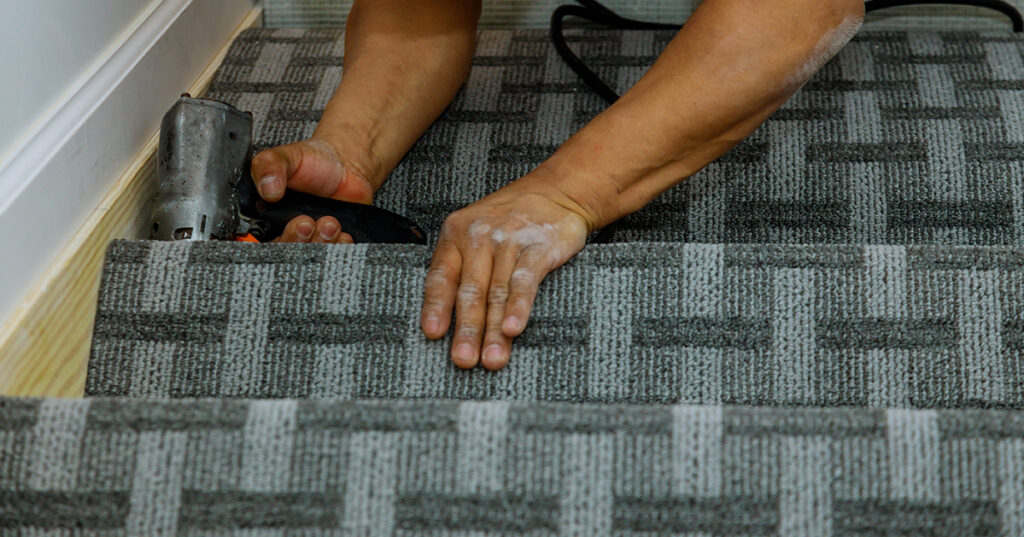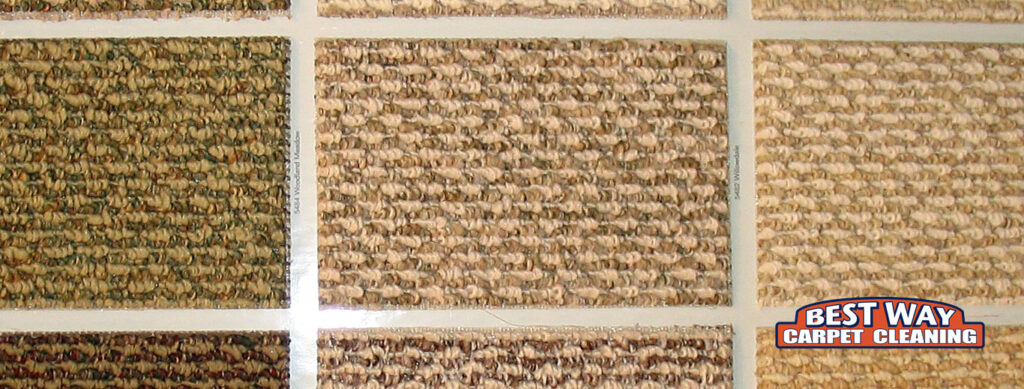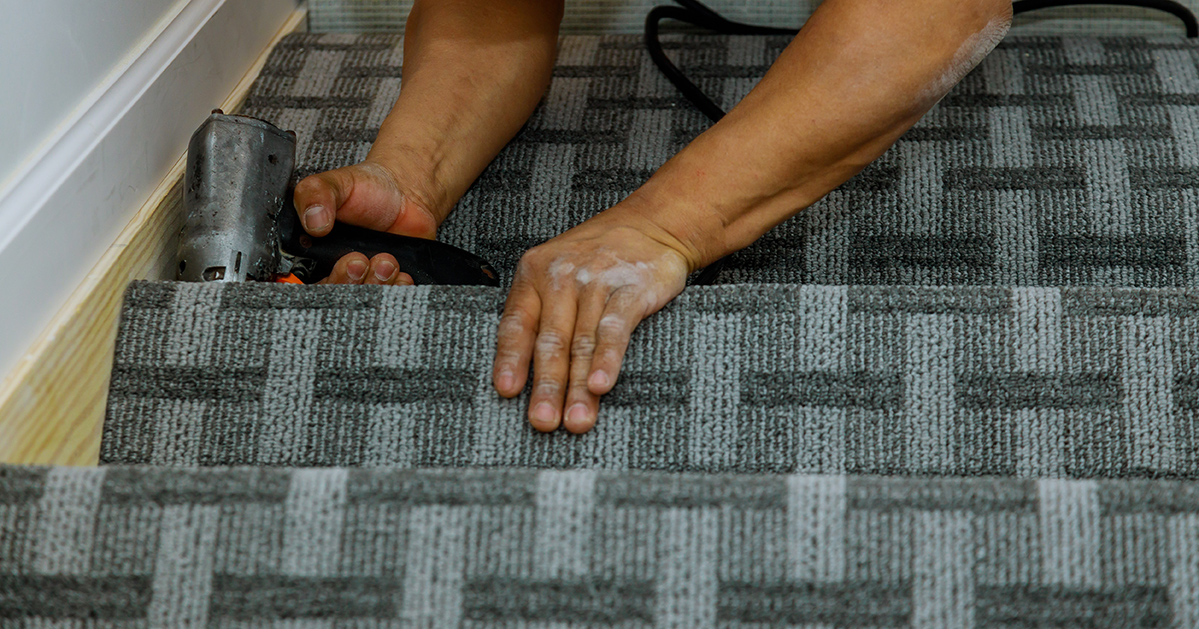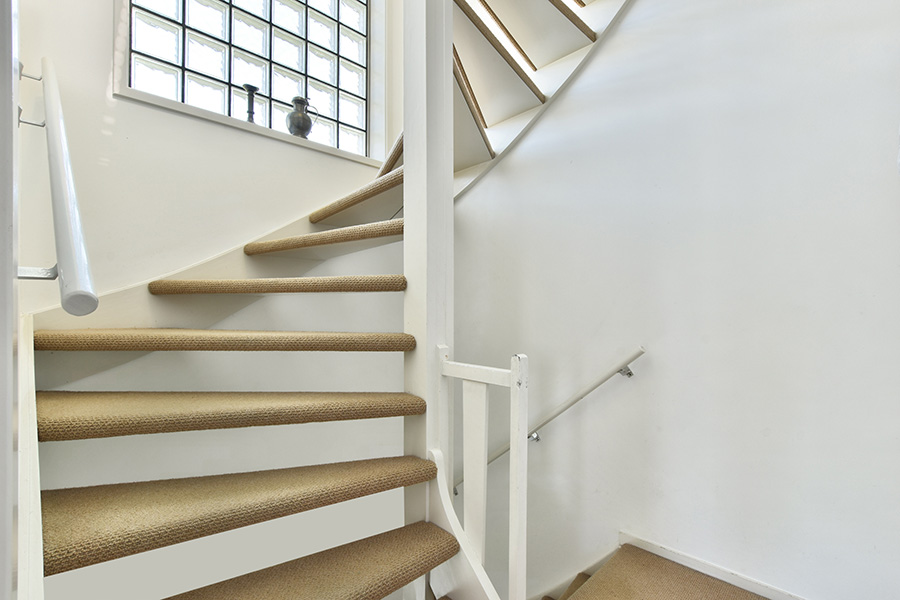
Stair Carpet Options: What’s the best one?
The Short Answer:
For stairs considered a high-traffic area, most homeowners will do fine choosing either a low-pile Nylon carpet with a high-density fiber count or a tightly woven Berber Carpet. It is also recommended to use the highest-rated padding recommended by the carpet manufacturer for the specific carpet you select.
Why is Nylon the Superior Carpet Fiber?
Even with all the advancements in carpet fiber technology and the more recent invention of Triexta (Smart Strand), if you ask any professional carpet cleaner what the longest-lasting carpet fiber they service is, the answer is guaranteed Nylon carpet. Nylon fibers are more durable and the best-wearing synthetic carpet fiber ever created. When Nylon fibers are created, they are given a heat memory twist which gives them more cushion when walking on and when professionally cleaned, they will want to stand tall again. Fibers like Polyester get a memory of being crushed over a short period and will not bounce back as a quality Nylon carpet will.
What is Berber Carpet?
Many people believe the Berber carpet is the best carpet covering for stairs, while others claim it’s a bit dated. There are a few reasons for this claim. First, Berber carpet is durable and can withstand a lot of wear and tear. This is important because stairs are typically high-traffic areas. Second, Berber carpet is slip-resistant, which is important for safety reasons. Third, Berber carpet is available in various colors and styles, so you can find a style that fits your home décor. It can be budget-friendly, and provide the qualities you’re looking for. That said, the general answer doesn’t include numerous other factors. Below, we’ll go more in-depth in answering this multi-pronged question.

The Long Answer:
Making the Best Carpet Choice for Your Stairs – It Depends
Unfortunately, there isn’t a one size fits all answer to this question. The question is subjective at best, but we’ll provide you with a few factors to help with the decision-making.
- The style of stairs. Not all stairs are the same; how they are designed will play a factor in deciding which carpet to go with.
- The amount of foot traffic. If you have a larger family coming in and out of your home, you’ll want to choose a carpet that can withstand a lot of wear and tear.
- Matching color and style with existing decor. If you want the stairs to blend in with the rest of the house, you’ll want to choose a matching color or a neutral color like beige or gray.
- Budget. Carpets can range in price from very affordable to quite expensive. By taking all of these factors into consideration, you’ll have the information necessary to proceed.
Buying Carpet for Stairs: Factors to Consider
Regarding carpet care, not all carpet products are created equal. Different types of carpets require different care, and each type may have its own recommended cleaning products and procedures. Here are just a few types of carpet fiber materials:
- – Nylon carpet is one of the most popular types of carpet and is known for being durable and easy to clean.
- – Polyester carpet is widely available but compared to nylon, it just does not have the durability for long life.
- – Olefin carpet is known for being stain-resistant and easy to clean. Most Berber carpet is made from Olefin.
- – Wool carpet is a luxurious type known for being soft and durable.
- – Silk carpet is the most delicate type of carpet known for being luxurious and soft. The best way to clean silk carpet is to have it professionally cleaned every 6-12 months.
Durability, Stain Resistance, and Ease of Cleaning
Most homeowners want to find a product that withstands years of foot traffic and everyday use, is resistant to stains, and is easy to clean.
Durability: Carpet is an investment, so its longevity matters. Look for a carpet made of durable fibers, such as nylon or polyester. Also, be sure to choose a carpet with a tight weave. The tighter the weave, the more durable the carpet will be.
Stain resistance: For larger families and pets, spills happen, so a carpet that is easy to clean and stain-resistant is the best option. Look for a carpet that is treated with a stain-resistant finish. This will help to protect the carpet from spills and stains.
Ease of cleaning: Look for carpet that can be vacuumed and spot-cleaned quickly and easily.
Since durable carpets can withstand heavy foot traffic, they will not show wear and tear as easily as less durable carpets. Stain-resistant carpets will make it easier for you to clean in the event of spills or accidents.
To ensure your carpet is durable and stain-resistant, choose a tightly woven carpet. It is going to provide better performance over time. Stains and wear patterns will be less noticeable on this type of carpet.
Low Pile 3/4″ or Less – Best Height for Heavy Traffic
Carpet pile and height are important factors in selecting the right carpet. The pile height is the measurement from the top of the carpet pile to the bottom of the backing. The lower the pile height, the less likely the carpet is to show wear and tear. For areas in your home that get a lot of foot traffic, it’s best to choose a carpet with a lower pile height. Carpets with a lower pile height are also easier to clean. Dirt and debris are easier to vacuum up from a low pile carpet. You can’t go wrong with a good quality low pile carpet, whether it’s a cut pile, twisted or looped style. It’s important to look for a carpet that feels good on your feet and is pleasing to the eye and the home’s decor.
High-Density Fiber – Woven Tightly
The denser the fabric, the better. Lower-density carpets can, however, be installed on stairs without any problems. The density of wool carpets, for instance, tends to be lower than that of synthetic fiber carpets, but wool carpets are also considered among the best carpets for stairs. The quality of the carpet depends on several factors (such as material strength).
The higher the density rating, the more durable the carpet will be.
The tuft twist or several fiber twists in a one-inch length of carpeting affects how it looks in your space. A carpet with a high tuft twist is easier to clean and maintain. It also has a longer lifespan and is more durable than carpet with a low tuft twist.
Commercial Grade Carpet as An Option
A lot of homeowners don’t know that carpet comes in two grades: residential and commercial grades. Commercial-grade carpets are designed with durability, stain resistance, and easy maintenance. They are not necessarily designed with comfort in mind. Commercial carpets can be used in residential homes and may be a good option for very high-traffic areas such as stairs. However, remember that they aren’t the softest or most comfortable carpets to walk on. You will need carpet padding no greater than 3/8″ if you should decide to use commercial carpeting.
Padding Weight Matters
There are different factors when deciding on an appropriate carpet cushion. The better quality of padding can help extend the life of your carpet. It will also help reduce the amount of wear and tear over time. The density of the padding is more of a determining factor than the thickness. Carpet density is measured by carpet padding weight. Carpet padding comes in 3lb to 10lb weights. 6lb is a carpet padding weight most commonly used in residential homes. 8lb padding is recommended for stairs and other high-traffic areas. 8lb carpet padding isn’t as soft as the 6lb padding, but it’s more durable. Thicker is not better. For most residential homes, it is recommended to use 1/2″ carpet padding. For high-traffic areas and stairs, 3/8″ might be a better choice. Padding that is too thick may shorten the lifespan of low-pile carpets.
Benefits of Soft Stair Tread Carpet
So, if you have beautiful hardwood or hand-painted stairs, you don’t have to cover them completely with carpet. If you want a slip-resistant and comfortable option for your staircase, look no further than soft stair treads. These carpeted treads, made of soft and durable materials, provide a slip-resistant surface that is gentle on the feet and simple to maintain. Aside from being simple to clean and maintain, they do not completely cover the steps, allowing the color balance to complement the surrounding decor.
Stair Runners Are an Option
The term “stair runner” is a narrow strip of carpeting installed down the middle of the staircase. It can be any width and length. Stair runners are a popular option for many homeowners because they offer several benefits. Stairs can be slippery, especially if made of hardwood. Stair runners provide a bit of traction that can help to prevent slips and falls. Third, stair runners can add a touch of style to your stairs. Stair runners come in a wide variety of colors and patterns, which means that you can find one that perfectly fits the style of your home. This is a great way to add a bit of personality to your stairs and make them stand out.
Environmental Factors
Carpet VOCs: Are They a Cause for Concern?
Can carpet be unhealthy? The answer is – yes; if we’re exposed to VOCs for a long time, we may experience health problems for ourselves, our pets, and the environment. It has become common knowledge that vo cs are harmful, and both the EPA and the American lung association agree. Low VOC carpet is widely available from the best carpet brands, and zero and low VOC flooring products are becoming more common.
The Best Carpet For Stairs is The One That Works Best For You
There are many factors to consider when deciding on the right carpet for stairs, including safety, durability, and matching decor. Carpeting can be an effective way to make your stairs safer, as it can provide traction and cushion to help prevent slippage. Whether completely covering your stairs, using treads, or a stair runner, choose a carpet that is made from high-quality materials and is low-pile to minimize the risk of trip-and-fall accidents. Health-wise, choose a carpet that is also easy to clean and vacuum. So the right carpet for stairs depends on your individual needs and preferences. We hope this has helped simplify your decision-making process.
Glossary:
Berber Carpet:
Berber is a carpet and rug style made from wool or synthetic fiber. It is named after the Berber people of North Africa, known for their hand-woven rugs and carpets. Berber carpet is usually made with a loop pile construction, which means that the yarn forms loops that stand up from the backing. This carpet is durable and easy to clean, making it a popular choice for homes and businesses.
Low Pile Carpet:
A low pile carpet is a type of carpet that has a short, dense pile. It is usually made of wool or synthetic fibers and is often used in high-traffic areas. Low pile carpets can be easier to clean and maintain than other types of carpets.
Carpet Density Rating:
The FHA has minimum density requirements for carpeting, which refers to the number of fiber strands per unit area. Higher density means less matting and more durability. Carpet density is not necessarily a reliable quality indicator, other attributes should also be evaluated.
Carpet Density Rating Calculation:
To calculate carpet density, you need to multiply the carpet face weight by 36, and then divide that number by the carpet pile height. For example, if you have a carpet with a 60-ounce face weight and a .75-inch pile height, the density would be 2,880 ounces per cubic yard. Carpet density is important to consider when purchasing and installing a carpet, as it can affect how long the carpet lasts. For most residential situations, you’ll want to install a carpet with at least a 3,600 density. For commercial locations, it’s recommended to look for a density of 5,000 or higher.
Carpet Padding Weight:
Carpet padding weight (or density) is an important factor when shopping for the perfect cushioning. It is usually measured in pounds per cubic foot, and most carpet pads fall in the 3-10 lb range. For the best value, 6-lb. padding is common for residential carpets. For the best durability And comfort, an 8-lb. pad is best for high-traffic areas and stairs.



